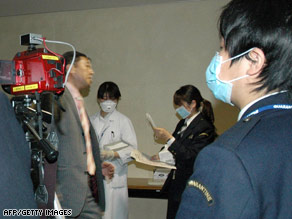 (CNN) -- Mexican officials are asking citizens to avoid large crowds, refrain from kissing as a greeting and maintain a distance of at least 1.8 meters (six feet) from each other amid growing concern in the country and elsewhere over new cases of suspected and confirmed swine flu infection.
(CNN) -- Mexican officials are asking citizens to avoid large crowds, refrain from kissing as a greeting and maintain a distance of at least 1.8 meters (six feet) from each other amid growing concern in the country and elsewhere over new cases of suspected and confirmed swine flu infection.Several countries issued travel notices and tightened restrictions to brace against the virus the World Health Organization is calling "a public health emergency of international concern."
By Sunday, 81 deaths had been deemed "likely linked" to a deadly new strain of the virus by health authorities in Mexico. Viral testing has confirmed 20 cases, said Dr. Jose A. Cordova Villalobos, Mexico's health secretary. In the United States, the number of confirmed swine flu cases stood at 11.
In New Zealand, officials said 22 students and three teachers, who returned from a three-week-long language trip to Mexico, may have been infected with the virus.
The 25 students and teachers at Auckland's Rangitoto College returned to New Zealand via Los Angeles on Saturday.
Fourteen have shown flu-like symptoms, with four "more unwell than others," said Dr. Julia Peters, clinical director of Auckland Regional Public Health Service.
Health Minister Tony Ryall said 10 students tested positive for influenza A. The specimens will be sent to WHO to determine whether it is H1N1 swine influenza. H1N1 influenza is a subset of influenza A.
The WHO results are expected back by midweek. The group remains quarantined at home.

"It's certainly has not been confirmed that they have swine flu," said Dr. Craig Thornley, medical officer of health in influenza. "We already have provisional information that some of the group have influenza A. We won't know if they have the type of influenza A that is swine flu."
In England, authorities stressed that a crew member who developed flu-like symptoms during a flight from Mexico City to Heathrow did not test positive for swine flu.
"I can confirm that the patient doesn't have swine flu," said Jonathan Street, a spokesman for Northwick Park Hospital in London.
"We have done all test, and they all came back negative."
In Israel, doctors are running tests on a man who recently returned from Mexico with light flu symptoms.
U.S. health officials said Friday that some cases of the virus in the United States matched samples of the deadly Mexican virus. All the patients have recovered or are expected to.
The panic over the virus prompted Canada to issue a travel health notice, saying the public health agency was "tracking clusters of severe respiratory illness with deaths in Mexico."
South Korea said it will test airline passengers arriving from the United States. And Japan will convene a Cabinet meeting Monday to come up with measures to block the entry of the virus into the country.
 The United States had not issued any travel warnings or quarantines.
The United States had not issued any travel warnings or quarantines.But US Airways said Saturday night it would allow passengers to change plans if they wanted to because of the outbreak.
Airline spokeswoman Michelle Mohr said it was not asking people not to travel to Mexico, but wanted to "give them that flexibility" if "they don't feel comfortable."
Gregory Hartl, of the World Health Organization, said the strain of the virus seen in Mexico is worrisome because it has mutated from older strains.
"Any time that there is a virus which changes ... it means perhaps the immunities the human body has built up to dealing with influenza might not be adjusted well enough to dealing with this new virus," Hartl said.
He said that, in Mexico, otherwise young, healthy people have been hit by the virus -- "one of the pieces of the puzzle that is worrying us," he said.
Mexico City has closed all of its schools and universities until further notice because of the virus.
More than 1,300 people with flu-like symptoms have been admitted to hospitals in Mexico, and officials are trying to determine how many of them have swine flu, said Jose Cordova Villalobos, the country's health minister.
The H1N1 strain of swine flu is usually associated with pigs. When the flu spreads person-to-person, instead of from animals to humans, it can continue to mutate, making it a tougher strain that is harder to treat or fight off.
Symptoms of swine flu include fever, lethargy, lack of appetite, coughing, runny nose, sore throat, nausea, vomiting and diarrhea, the CDC said.
President Barack Obama, who visited Mexico last week en route to the Summit of the Americas in Trinidad and Tobago, is not sick.
"The president's trip to Mexico has not put his health in any danger," spokesman Robert Gibbs said.















No comments:
Post a Comment